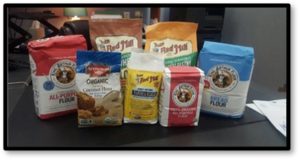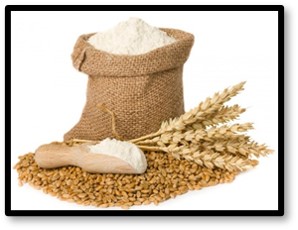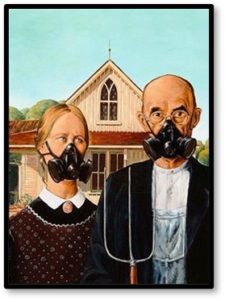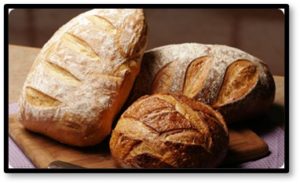Monday Author: Susanne Skinner
Perhaps this war will make it simpler for us to go back to some of the old ways we knew before we came over to this land and made the Big Money. Perhaps, even, we will remember how to make good bread again. ~ M.F.K. Fisher
First, they came for the disinfectants. Hand sanitizer, wipes, and sprays quickly disappeared. Empty shelves stood in aisles where cleanliness and godliness once reigned.
 Next up—toilet paper, paper towel and Kleenex. Fear of living without these basics stripped the stores clean. Online providers sold out. Black market sales and tik-tok videos flooded the internet. Products appeared on eBay to buyers willing to pay egregious pricing.
Next up—toilet paper, paper towel and Kleenex. Fear of living without these basics stripped the stores clean. Online providers sold out. Black market sales and tik-tok videos flooded the internet. Products appeared on eBay to buyers willing to pay egregious pricing.
Finally, dry goods became scarce. Shelf-stable items like rice and beans offer low-cost meal options when jobs are eliminated.
But unexpected items like flour and yeast vaporized with everything else. Shoppers stared at empty shelves asking, “where have all the flours gone?”
Pandemic Baking
Readily available baked goods symbolize the working family. Folks rely on the convenience of in-store bakeries as a time saver. It’s not that people can’t bake; they just allocate time differently.
Covid-19 ripped that luxury away as quarantine became the de facto standard. Convenience food was a thing of the past and flour became the poster child for pandemic survival. Americans declared baking to be their new hobby. Sourdough is trending, and bread is proof we can survive in the time of coronavirus.
I am an intermittent but skilled bread baker. There are only two of us, so bread gets stale before it’s consumed. Florida stores sell freshly baked Cuban bread for $1.00, but when we have dinner guests, we serve homemade baked-by-me bread.
I learned bread baking from my grandmother, mother, and my Great Aunt Minnie. Over the years, I’ve perched on many a cooking class stool to expand my skills. I’m the person people side-eye look at when someone asks, “Who buys flour in 25-pound bags?”
Quarantine presented the opportunity to pull out my list of ‘someday’ baking projects. Recipes requiring multiple steps, advanced techniques, and long periods of waiting to oversee completion.
Bread making is one such investment of time. There is a Zen feeling when nurturing a yeasted dough to its final baked goodness. Covid-19 became a sourdough throwdown. Suddenly everyone had endless days to create a starter and practice their free form loaf skills. I was right there with them. Two failed batches happened before I hit a home run.
The Staff of Life
 Bread is a staple of life. In my grandparent’s house, making bread was the only way to have enough for a family of nine. Nobody bought bread.
Bread is a staple of life. In my grandparent’s house, making bread was the only way to have enough for a family of nine. Nobody bought bread.
I was raised in Europe where bread is on every table at every meal. Dad stopped at the village bakery every single day for fresh croissants and a baguette and I became a bread snob.
When visiting the U.S. I’d stay with Great Aunt Minnie in northern Wisconsin, learning to make bread and Parker House rolls. Aunt Minnie wasn’t one for measuring. She estimated ingredients until “the dough felt right.” She taught me about the elasticity of dough and the importance of kneading and resting.
When convenience shopping dried up, America went into the kitchen to prove its baking mojo. Flour sales spiked 200% and manufacturers can’t keep up with demand. Ethical buying became a buzz word as people stockpiled for the pandemic long haul.
The Pioneer Spirit
When Covid-19 achieved pandemic status, people began panic buying. The first panic wave reflects the assumption that we will stay home until the threat is gone. In Florida, we’re familiar with this behavior; typical in hurricane season. We make sure we have what is needed if one of those bad boys makes landfall in the ‘hood.
 It’s a short-term thing, limited to bottled water and foods easily prepared during a power loss. Within weeks life resumes a normal cadence.
It’s a short-term thing, limited to bottled water and foods easily prepared during a power loss. Within weeks life resumes a normal cadence.
Coronavirus turned weeks to months. Our pioneer spirit has us canning, sewing, freezing, and baking. We’ve literally baked the flour off grocery store shelves. Not only plain white, but cake flour, bread flour, rye, wheat, almond, chickpea, and coconut flour are MIA. All-purpose, self-rising and unbleached are nowhere to be found. Even cornmeal is scarce. Bob’s Red Mill, the go-to for ancient grains and specialty flours, is sold out. King Arthur Flour is out of stock. Yeast – forgetaboutit.
Our main grocery store is Publix, and the baking shelves are bare. My local Aldi has flour and yeast, with a limit of two per shopper. I buy both in bulk (easily stored in the freezer) and was well stocked before Covid-19 came to town. Quarantine offered the opportunity to up my baking game. Recipes deemed too intense for regular life were called on to prove themselves.
Flour Power
 There is something therapeutic about bread dough, and the smell and taste of home-baked bread is a simple pleasure. So why are people suddenly doing it?
There is something therapeutic about bread dough, and the smell and taste of home-baked bread is a simple pleasure. So why are people suddenly doing it?
When it feels like nothing is under our control, we look for things we can still do. Days feel longer than ever, and baking is purposeful and productive. Long-term isolation is stressful, making bread is oddly comforting.
In times of crisis, people seek a level of well-being they can control. Freshly baked bread is flour power at its best. Combining flour, water, yeast, and salt is psychologically reassuring. The holy grail of homemade bread offers an edible diversion from breaking news, anxiety, and fear.
A Simpler Time
We’ve been stopped in our tracks by a virus. It robbed us of the life we know but it has also forcefully returned us to a simpler time and place. In rediscovering ourselves perhaps we will find a bit of Martha Stewart lives in all of us.
Bake on America This will pass.

I’ve been planting fruit bushes and trees. Next year, G-d willing (and the wife doesn’t scream) it’s vegetables in beds. I’m also considering getting chickens. I’ve just made my first batch of pickled garlic and will try some other toe-in-the-water experiments with food preservation.
Civilization has ALWAYS been a thin crust over the savage volcano, and the stripped-shelves have cracked that crust. Current and impending shortages (e.g., meat) will build on that.
In the long run, I count that as a good thing. People need to be far more prepared than they are. Short term, though, it’ll be painful.